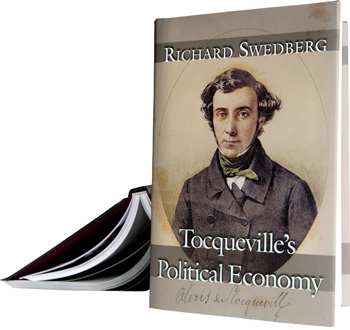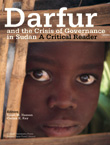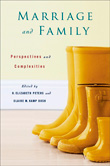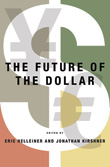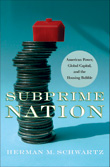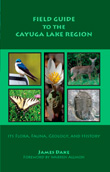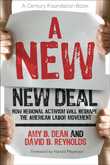CORNELL BOOKS
Sudan solutions, housing hubris, marriage motivations, trail traipsing, the dollar's demise
Swedberg takes on Tocqueville and Weber
Sociology professor Richard Swedberg writes about Alexis de Tocqueville and edits Max Weber in two new books about political economy in the 19th century.
In "Tocqueville's Political Economy" (Princeton University Press), Swedberg "persuasively presents Tocqueville as a creative and original analyst of economic topics," writes Tocqueville expert and author James T. Schleifer in a cover review. "Swedberg's work focuses especially on Tocqueville's way of thinking, and is a fresh, outstanding addition to contemporary Tocqueville scholarship and to the study of modern economic thought."
In the new edition of "The Protestant Ethic and the Spirit of Capitalism" (Norton Critical Editions), Swedberg edits four critical essays -- and contributes one of his own -- on Weber's landmark 1904 tome.
"From the moment that it was published, Weber's study has led to a stormy debate that is still going on," Swedberg writes. "Its readers either admire the arguments in 'The Protestant Ethic' or dislike them."
Collaborating on solutions in the Sudan
Salah Hassan, director of the Africana Studies and Research Center and professor of African and African diaspora art history, is the co-editor of a new volume, "Darfur and the Crisis of Governance in Sudan: A Critical Reader" (Cornell University Press, 2009), about the ongoing conflict in the western Sudanese region of Darfur. Hassan edited the book with Carina Ray, assistant professor of African and black Atlantic history at Fordham University.
The book aims to go beyond what most coverage of the crisis provides -- a cursory understanding of the historical, economic, political, sociological and environmental factors that contribute to the conflict -- to offer perspectives by the people of Darfur and the Sudan. As a result of this superficial coverage, Sudanese civil society's active engagement in resolving the country's problems goes unrecognized, the book's editors say.
The volume brings together a diverse group of contributors from Sudan and beyond -- scholars, activists, NGO and aid workers, members of government and the Darfurian rebel movements, and artists -- who provide a comprehensive, balanced and nuanced account of the conflict's roots and the contemporary realities that shape the experiences of those living in the region.
The book also features a portfolio of full-color photographs of daily life in Darfur by photographer Issam A. Abdelhafiez.
'I do' ... but why?
Why do people get married? Policy analysis and management professor H. Elizabeth Peters explores the question in "Marriage and Family: Perspectives and Complexities," which she co-edited with Ohio State University sociologist Claire Kamp Dush.
The book, published by Columbia University Press, explores the motivation to marry and the role of matrimony in a diverse group of men and women from a variety of perspectives, including historical, cross-cultural, gendered, demographic, socio-biological and social-psychological. Comparing empirical data from emerging family types (single, co-parent, gay and lesbian, among others) and studies of traditional nuclear families, Peters and Kamp Dush also consider the effect of public policy and recent economic developments on the practice of marriage and the stabilization or destabilization of family.
Predicting the future of the dollar
Predictions of the U.S. dollar's demise as an international currency have accompanied major international financial crises for the past four decades. In "The Future of the Dollar" (Cornell University Press, 2009, a "Cornell Studies in Money" book), co-editor Jonathan Kirshner, professor of government, explores analysts' and scholars' profound disagreements about this question.
For half a century, the United States has garnered substantial political and economic benefits as a result of the dollar's de facto role as a global currency. In recent years, however, the dollar's preponderant position in world markets has been challenged. The dollar has been more volatile than ever against foreign currencies, and various nations have switched to non-dollar instruments in their transactions. China and the Arab Gulf states continue to hold massive amounts of U.S. government obligations, in effect subsidizing U.S. current account deficits, and those holdings are a point of potential vulnerability for American policy.
The book's other co-editor is Eric Helleiner, professor of political science at the Balsillie School of International Affairs, University of Waterloo, Canada.
'Subprime Nation'
U.S. growth and power worldwide over the last 20 years have depended in large part on domestic housing markets, asserts Herman Schwartz in "Subprime Nation: American Power, Global Capital and the Housing Bubble" (Cornell University Press, 2009, a "Cornell Studies in Money" book).
Schwartz, M.A. '84, Ph.D. '86, professor of politics at the University of Virginia, explains that mortgage-based securities attracted a cascade of overseas capital into the U.S. economy. High levels of private home ownership, particularly in the United States and the United Kingdom, helped pull in a disproportionately large share of world capital flows, says the book.
Beginning in mid-2008, mortgage lenders became ever more eager to extend housing loans, for the more mortgage packages they securitized, the higher their profits. As a result, they were dangerously inventive in creating new mortgage products, notably adjustable-rate and subprime mortgages, to attract new, mainly first-time, buyers into the housing market.
However, mortgage-based instruments work only when confidence in the mortgage system is maintained, Schwartz says. Regulatory failures in the U.S. savings and loan sector, the accounting crisis that led to the extinction of Arthur Andersen LLP and the subprime crisis that destroyed Lehman Brothers and Merrill Lynch and damaged many other big financial institutions have jeopardized a significant engine of economic growth.
Schwartz concentrates on the effect of U.S. regulatory failure on the international economy. He argues that the "local" problem of the housing crisis carries substantial and ongoing risks for U.S. economic health, the continuing primacy of the U.S. dollar in international financial circles and U.S. hegemony in the world system.
Hit the trail
Going for a hike? Check out "Field Guide to the Cayuga Lake Region: Its Flora, Fauna, Geology and History," a new book by James Dake and colleagues at the Cornell-affiliated Paleontological Research Institution and the Cayuga Nature Center.
The field guide focuses on the areas surrounding Cayuga Lake, with sections on local history and geology, and descriptions of plant life and wildlife found across the region.
The guide is intended for hikers, summer camps and those who simply want to explore the area, says Paula Mikkelsen, PRI's associate director for science and director of publications. "I've already used it in my own backyard," she said.
Author Dake acts as the liaison between PRI and the nature center, fostering the collaboration between the two organizations. The book was funded with a grant from the Triad Foundation and published by PRI.
"Field Guide to the Cayuga Lake Region" can be purchased online at museumoftheearth.org and at the Museum of the Earth's gift shop.
Courting regional activists
David B. Reynolds (Ph.D., '93) is the co-author of "A New New Deal: How Regional Activism Will Reshape the American Labor Movement" (Cornell University Press, 2009), which details a plan to revitalize American labor activism and build stronger connections and a sense of common purpose between labor and community organizations.
Reynolds and co-author Amy B. Dean say that alliances organized at the regional level are the most effective tool to build a voice for working people in the workplace, community and halls of government. Reynolds and Dean argue that workplace battles should be seen not as the parochial concerns of isolated workers, but a fundamental struggle for America's future.
Reynolds is a labor extension coordinator at the Labor Studies Center of Wayne State University and a field organizer for Building Partnerships U.S.A.
